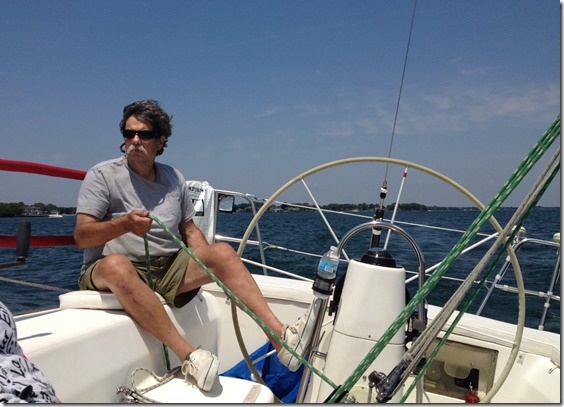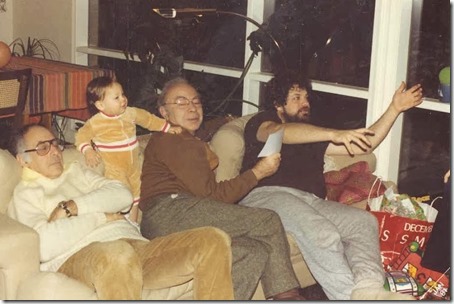I'm sitting with my mother and her three sisters, and we're watching the rockets attacking Israel. One aunt is on Skype with her daughter who just picked a really bad week to move to Tel Aviv. My cousin has a tendency toward fearlessness—when living in Sendai, Japan, during that earthquake/tidal wave/nuclear plant disaster she passed up offers from the U.S. consulate to get her out of there, instead organizing the evacuation of her schoolchildren. Now she's brushing aside her mother's terror: we have an Iron Dome; can I show you the floor of the apartment?
The American TV news is showing people fleeing the beach and she jokes that all those moving at a walking pace are the Israelis. The aunts don't see the humor; these are minutes carefully constructed—including the Skype call—to properly experience the horror of warfare. And when it's interrupted by the news shifting to Wimbledon the women lament, and complain of Western Civilization's warped priorities: here's civilians being shot at with rockets; now let's go to sport.
Here's sport. The reason that TV news can seamlessly shift from Hamas lobbing rockets to Roger Federer smashing lobs is because TV news turned news coverage into sports coverage. Here's the teams, here's the scores, here's a highlight reel, here's the day's-end results. You are welcome to lament this development; my point here is there's something so innately gratifying about sports that they turned news into it.
Getting in. I can't remember my first interactions with sports. There's a photo of me as an infant between my dad and my grandpas on a couch, and given the setup and the expressions (sleeping, discussing something else, WHAT THE HELL WAS THAT?) it's a good bet a game was on. I was just four months old the first time I was on a sailboat—my dad was a serious racer back then and had use of his captain's boat because he was the only crewman who knew how to fix it. I've been told I went to an '84 Tigers playoff game but I don't remember it. I don't remember my first Michigan game either—just the familiarity of going to Michigan games in later memories.
I remember going hours early to my great aunt's house for Thanksgiving, and sitting on the floor of the living room for the Lions game. I remember at the end of a morning ski lesson at Nub's Nob my dad coming to pick us up and all afternoon us showing him what we'd learned of pizza pies and french fries. I remember wearing space pajamas while watching March Madness on my parents' bed, and my dad getting in trouble for me being up. And I remember my dad instructing me on the proper breaking-in technique of my first baseball glove, and unwrapping the greasy twine early because I meant to take the glove to tailgate, and that my dad fished his out of the chaos of his garage shelves, and that I spent the drive to Ann Arbor admiring the old leather, the Rocky Colavito signature, and the bull's head brand in the palm that matched my own glove.
I don't remember when I started liking sports. I just remember my Dad was there.
From left: WWII vet, blogger, WWII vet, draft dodger
Distraction. My favorite MGoBlog piece is "Eleven Swans," when Brian felt, in the hours leading up to Football Armageddon (The Game 2006), that he needed to justify how such a thing could have importance in a world with an Israeli-Palestinian conflict in it:
And then you try to figure out why the stakes are so high in the first place. Why this entire week you haven't been able to concentrate on anything by war by proxy. Fake war by proxy. Meaningless war by proxy. You will suffer humiliation when the team from my area defeats the team from your area. It's ridiculous. Intelligent people do not spend a goodly swath of their life pouring emotion and precious time into a contest that affects no one and changes nothing except some inky scribbles in media guides.
The analogy that Kellen Winslow Jr. badly articulated in reference to a brutal injury he inflicted that one time is, in fact, true: sports is warfare. Our regional tribe shall fight theirs, and will do so in the manner that we all wish war was conducted: hardfast rules, individual heroics, minimal casualties, clear victories, and done by somebody else on our behalf.
My father was the first in his paternal lineage not to go to war. The first Fisher, according to the family history, deserted a British ship for an American one near Sault Ste. Marie in 1813. There was a Harry Fisher who distinguished himself in the Civil War, and a Colonel Leonard Prenzlauer from the Spanish-American War and WWI whom everyone called "Colonel" and was the namesake of an actually named "Colonel Fisher" in WWII who was a corporal and died in the war (family members, almost certainly apocryphally, claim he was Joseph Heller's inspiration for Major-Major), and that's why my dad's middle name was originally Colonel until my grandma awoke from the drugs they used back then and promptly changed it to Robert Leonard. My grandpas fought against real Nazis in The War, and the horrors of it made them old men before their thirties.
My dad played football at Cass Tech and his coach—perhaps every coach in the mid-'60s—was a vet who coached like it was a war, and his distaste for that started a rift with him and his father that wouldn't be repaired until I was born. My father spent the bulk of his twenties avoiding Vietnam by any means. He had a low draft number and after his first two years at MSU they got rid of student deferments. He and his best friend, who'd been at Michigan, transferred to Oakland University to keep their parents mollified while really doing nothing but play handball and research ways of getting around the draft. Eventually they came upon agricultural deferments, which is how two Jewish city boys became farmers. The New Deal system of the federal government buying up unplanted crops to keep food prices high enough to support farming was still in effect, so the years they were not-growing corn were able to offset the years they were just badly growing corn.
(For many reasons I read Catch 22 at an early age)
The way the WWII generation watched sports was different from my dad's generation, and different from mine. My grandpa treated it like an intense escape. He and his brothers-in-law went to the 1950 game—the one with all the snow—and he said ever after it was his favorite game ever because it was too cold for anybody to interrupt the game with talking. He wouldn't talk about the war much, except to bring up the fact that he fought it so that he could watch the damn game in peace.
My dad watched Michigan games in the stands, or at his best friend's house, or if neither were available from his bed; either way it was a background piece to a conversation that alternated between mutterings over the incompetence of the coaches and the other things in life.
He had little of the seriousness for sports that I developed. I'd complain to him of battles with the internet Nazis and the relativity of program goodness, and he'd shrug at these things then go back to the two great questions of our age: Why haven't they pulled this pitcher?, and Why are they running left again?. A few things were important and everything else was irrelevant, and nobody could bring irreverence to bear like my father. He was off-the-charts intelligent. He was unflinchingly ethical. He could mock anything because he had the mind and the desire to understand everything.
The things that are important. My aunts were all in town last week because on July 4th my dad suddenly passed away. He'd been a little sick with that cold everyone had that turned into mild bronchitis and pneumonia, but the antibiotics and pills had him feeling better by that Friday. He was gardening, and planning to sail in the afternoon, and when he collapsed I was on the phone with my Mom to invite them, conditional on my dad's state of health after sailing, to barbecue at our new house with all the kids and his two grandkids.
When I was 16 I got fired from a summer camp—I accidentally ran into a kid while refereeing ultimate frisbee and it just happened to be the kid who had a lawsuit going against the camp for the last time he and his parents imagined he was damaged, and rather than compound their situation they let me go. Then my car wouldn't start and I was stranded at the bus depot at Lahser and 11-mile, and I called my dad and said it was the worst day of my life, and he said "No, the worst day of your life is the day I die."
I've never a fought a war, never been in a position where I'd been expected to, or had to face the prospect of one. Lacking something so serious I developed a tendency—as I'm sure many of my generation did—to stage pitched battles over less relevant things. You've witnessed this as I've railed on this blog and in HTTV etc. about the Superbowlization of Michigan sports.
Today is my first official day "back" to blogging since July 4, and there's fireworks to mock, new plays to scribble, and an interview with former Michigan cornerbacks in re: what to expect from Peppers that are coming up. But I couldn't bring myself to put any of those together because the worst day of my life still envelopes all the thoughts.
So I want to say for the record, in lieu of all the complaints and nitpicks and devastations and hypocrisies that I typically point out, that these things are of just a relative importance to a thing of actual little importance. If it costs way more than it should to sit in a stadium that's become way too chintzy for a team that isn't nearly as good as it ought to be, that's 5% of an experience that's 95% spending some of a truly finite amount of breaths with the person you came with. I can't remember how sports became such a part of my life any more than I remember how my dad entered it. Sports were just something that my dad and I did with the 34 years of peace and good life afforded to us. And it was the most important thing in the world.

